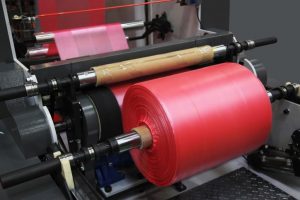Aquapak Helps Food Manufacturers (Dis)-Solve Plastic Packaging Waste

Sustainable plastics manufacturer Aquapak Polymers Limited is helping food manufacturers (dis)-solve the issue of how to reduce its plastic packaging waste. Last year in the UK only a third of plastic packaging was recycled, with the remaining two thirds being buried in landfill sites or burnt in incinerators.
Although the recycling rate for plastic bottles is comparatively high (60%), packaging for yoghurt pots, margarine tubs and ready meal containers is considerably lower (30%).
Packaging made with plastic film is the largest cause for concern – bread bags, pasta and rice packets, sandwich boxes and film on ready meal containers. Only 3% of this type of packaging was believed to be recycled in 2015.
“Part of the problem is consumers aren’t sure which types of plastic packaging can be recycled which is further compounded by disparity in local authority waste collection services,” explains Mike Everard, Managing Director of Aquapak Polymers.
“And yet the flexible packaging market is booming as manufacturers increasingly switch from rigid packaging to lightweight, less resource intensive alternatives. With only 20% of local authorities in the UK having provision to collect and recycle plastic film, it isn’t necessarily the most sustainable choice available for food producers and manufacturers – until now.
“Aquapak’s material does everything conventional plastic packaging film does in terms of functionality and performance, however it’s fully recyclable, biodegradable and non-toxic if it does end up in the water – where it will eventually dissolve.”
Increased extended producer responsibility combined with new targets for packaging recycling (75% – 80% by 2030) means that pressure is mounting on manufacturers to find packaging materials that are sustainable.
Although Aquapak is looking at a number of commercial applications for its flexible plastic, it is particularly well-suited for food packaging since it’s FDA approved and acts as an oil, solvent and air barrier, keeping dried or fresh food products fresher for longer. The material can be produced in a range of weights and thicknesses, can be clear or coloured and printed directly on without Corona treatment making it an ideal packaging solution for the food industry.
 Aquapak’s material is a formulated Polyvinyl Alcohol (PVOH) and is already well used for laundry detergent pouches that dissolve in the machine during the wash cycle. The company has spent the last seven years refining and modifying the PVOH production process to retain its solubility while radically improving its strength and functionality.
Aquapak’s material is a formulated Polyvinyl Alcohol (PVOH) and is already well used for laundry detergent pouches that dissolve in the machine during the wash cycle. The company has spent the last seven years refining and modifying the PVOH production process to retain its solubility while radically improving its strength and functionality.
Once packaging made from Aquapak’s material has been used it can be disposed of along with other recyclable household waste where it can either be recycled or processed through anaerobic digestion or via composting. It also doesn’t need to be de-packaged prior to processing which is another significant advantage.
Mike continues: “Environmental impact and sustainability is now firmly at the front of consumers’ minds when it comes to buying products and their packaging. The most important consideration for food manufacturers is that the packaging must be exceptionally functional, providing the necessary barrier properties to maintain and increase the lifespan of their products.
“With a lot of the materials available today, in particular bio-plastics, manufacturers have to make trade-offs in relation to how strong the packaging material is or how much it costs. For example, some biodegradable packaging just doesn’t offer the same functional performance of conventional materials, despite being environmentally better.”
There’s already a great deal of interest from the food and retail sectors in Aquapak’s material and a number of trials are currently taking place with leading food producers and manufacturers including a well known bakery chain and dairy company.
Aquapak believes its material has the potential to significantly drive up recycling rates for plastic packaging. Using a closed loop system the polymer can be recovered via a simple chemical process so it can be re-pelletised and reused. The resin has also been designed to work in standard polyethylene machines so production can be scaled up quickly as demand for the material increases.
Mike concludes: “When developing our material and process we’ve tried to look at creating a super material that provides food manufacturers with the full package; functionality and a choice of options when it comes to the end of its useful life.”

































